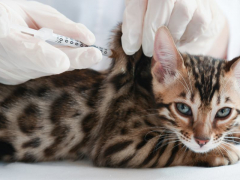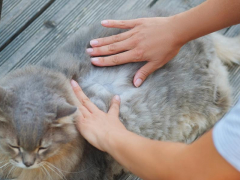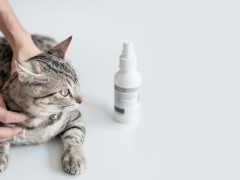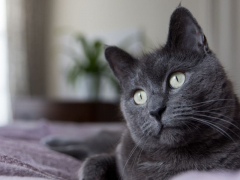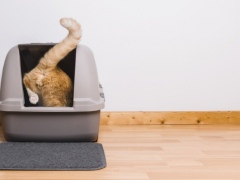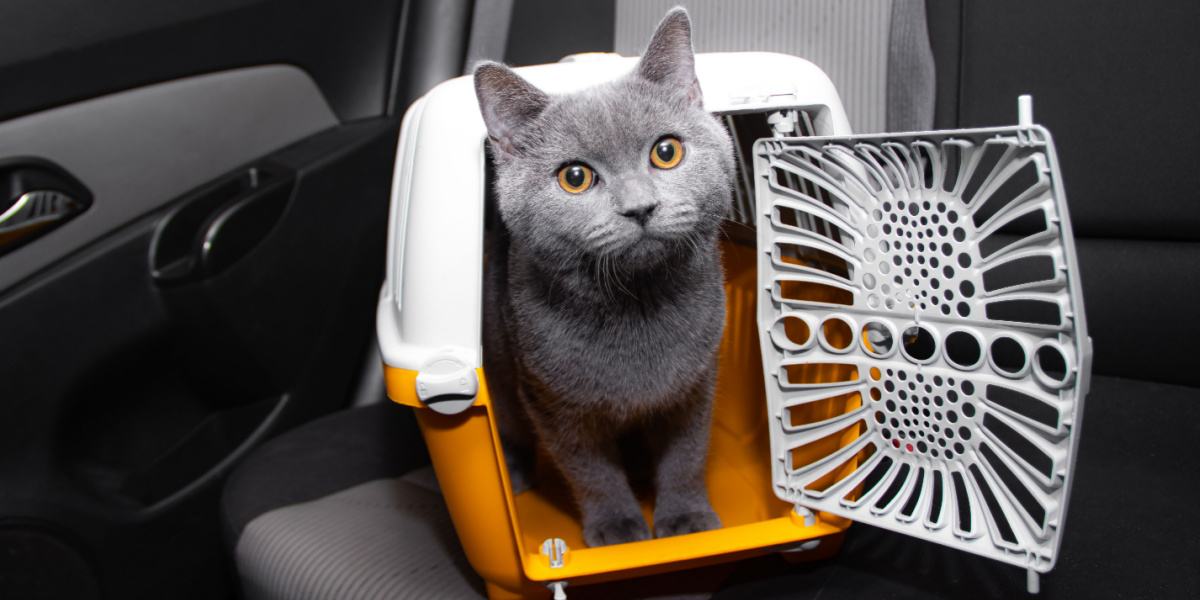
Trazodone is a sedative medication that is often used in cats to help reduce situational anxiety and stress. In this article, you’ll read about trazodone for cats: what it is, how it works, indications for its use, side effects to look for, and some frequently asked questions.
Trazodone for Cats Overview

About Trazodone for Cats
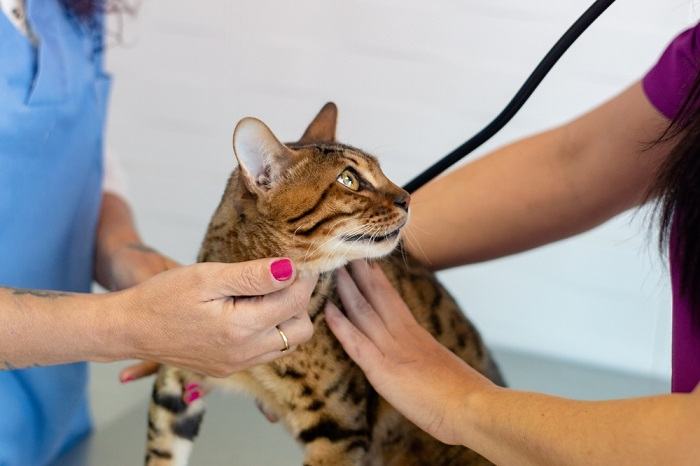
For many cats, a trip to the vet can induce unhealthy amounts of stress and anxiety.
Trazodone is classified as a serotonin antagonist (5-HT2A) reuptake inhibitor. This means it is a type of antidepressant medication.
Trazodone is not a federally scheduled or controlled medication in the United States. It is still considered a drug of interest in some jurisdictions that requires some additional monitoring by veterinary care providers.
It is generally utilized for more short-term use benefits, usually related to behavioral problems and situational stress or anxiety. Examples of typical feline stressors include visits to the veterinary clinic, hospital stays, and car or plane travel.
While trazodone is more often used in dogs, there have been studies in cats that have shown it to be a viable option for cats.
Trazodone may be used alongside other medications in dogs as long-term medication for anxiety and other behavioral disorders. However, this is not a common indication of its use in cats.
Also Read: Best Large Cat Carriers For Travel Reviewed
What Does Trazodone Do for Cats?
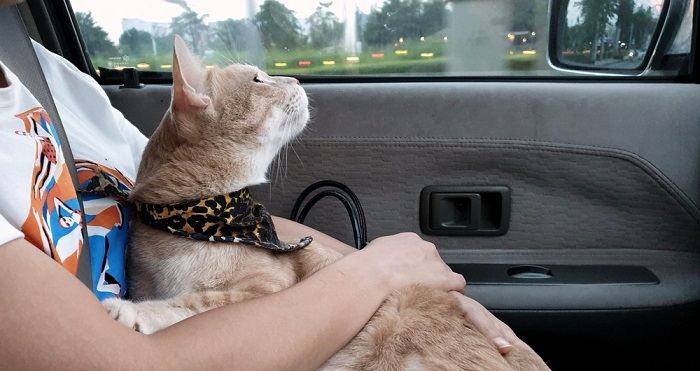
Most cats view travel by car or plane to be a hugely stressful event.
While trazodone use in dogs has been far more extensively studied, there have been some studies in cats. These studies suggest trazodone is an effective sedative that can be safely administered to stressed cats to remove symptoms of anxiety.
Another study looked at trazodone use in cats during echocardiograms (heart sonograms). It showed that trazodone lowered blood pressure in healthy cats but led to no alterations in the results for the echocardiograms. Since we know that cats often have elevated blood pressure during exams and procedures, this finding suggests that anxiety during handling was reduced without significant effects on the heart.
In a placebo-controlled study published in the Journal of the American Veterinary Medical Association (JAVMA) in 2016, 10 cats with a history of anxiety during travel/transport and/or vet exams were given trazodone 60-90 minutes prior to a visit or instance of travel. In this study, not a single cat displayed signs of anxiety related to the travel or examination and stress scores were significantly better.
As many kitty parents are aware, gabapentin is often used to reduce a cat’s anxiety or stress. Although it works very differently, trazodone has similar effects. Trazodone and gabapentin can be used together for cats that need both medications to help with stress, anxiety, or handling.
Also Read: 5 Visual Signs Of A Stressed Cat And How To Help
Common Side Effects of Trazodone for Cats

Trazodone is considered a sedative and it makes cats drowsy.
Trazodone is tolerated in most patients. As it is used most often as a sedative, this is an expected effect to see.
In the JAVMA study involving 10 cats, the most commonly reported potential side effects in cats included (other than sedation): vomiting, gagging, diarrhea, hypersalivation (excessive drooling), paradoxical excitement, behavioral disinhibition, and ataxia (unbalanced walking).
Gagging and excessive drooling are common responses to the bitter taste of medication and the act of tablet administration.
Paradoxical excitement and behavioral disinhibition describe unexpected behavioral effects. In this case, the calm behavior and sedation effects are what is expected. However, excitement, agitation, irritation, and aggression paradoxically happen instead. This is an uncommon side-effect of sedatives but can occur with any type of sedative or anxiety relief medication.
Ataxia or wobbly, unbalanced walking, is a more common side effect of sedatives. This happens more commonly when a cat is drowsy from the medication. It should wear off with the sedative effects.
Uncommon Side Effects of Trazodone for Cats
Because trazodone is classified as an antidepressant and acts as a serotonin reuptake inhibitor, it can contribute to a side effect called serotonin syndrome where serotonin levels become too high in the body.
Common signs of serotonin syndrome include vomiting, diarrhea, seizures, elevated body temperature, depression, hypersalivation, difficulty breathing, disorientation, coma, and sometimes death.
Fortunately, trazodone is very unlikely to cause serotonin syndrome at typical dosages, but caution must be used if using trazodone alongside certain other drugs.
Some of these common drug interactions are included below but are not limited to just what is listed. It’s always important to make your veterinarian fully aware of any medications your cat is currently on before considering trazodone.
Concurrent use with cisapride (a medication used for recurrent constipation in cats), as well as fluoroquinolone antibiotics (pradofloxacin, marbofloxacin), may increase the risk for an arrhythmia called QT prolongation. However, this has unknown implications for pets.
Using trazodone with furosemide (Lasix) may increase the risk of low sodium levels.
If your cat is taking trazodone with any hypotensive drugs like amlodipine or telmisartan, it may further reduce blood pressure and cause hypotension.
The use of trazodone with the appetite stimulant mirtazapine (Mirataz) can increase the risk for further depression, serotonin syndrome, and QT prolongation.
A cat taking serotonin reuptake inhibitors like fluoxetine (Prozac) alongside trazodone may increase the risk for serotonin syndrome. These drugs are commonly used together but careful monitoring is always recommended.
An increased risk of serotonin syndrome may also occur with concurrent use of tramadol and tricyclic antidepressant medications like amitriptyline.
Also Read: Do Cats Feel Sadness?
Signs of Trazodone Overdose
Signs of a trazodone overdose in cats and dogs include excessive sedation, lethargy, ataxia, and vomiting.
As with many medications, caution should be exercised using trazodone in cats with substantial liver or kidney disease.
If you are ever concerned that your kitty may have developed side effects while using trazodone or if an overdose is suspected, make sure to contact your veterinarian, the ASPCA Animal Poison Control Center (1-888-426-4435), or Pet Poison Helpline (1-855-764-7661) immediately for further advice.
Also Read: Drug Poisoning In Cats: Causes, Symptoms, & Treatment
Trazodone for Cats Dosage
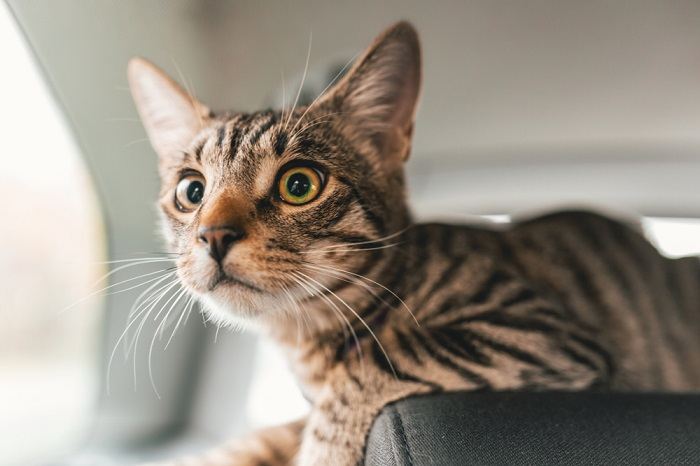
Since using trazodone is considered off-label and cats respond differently to dosages, it is best to follow the guidance of your vet.
Trazodone is not FDA-approved for use in cats. Use in cats is considered off-label, which is very common in veterinary medicine. Dosing is often based on studies, clinical experience, and responses in individual patients.
In the 10-cat study from JAVMA, a dose of 50mg per cat (not 50mg per kilogram) was used 60-90 minutes prior to a veterinary visit and a generally good response was seen.
However, in any patient, the effective dose and duration of use of trazodone vary widely. For example, in another study, 100mg was used but it took 2 hours for peak sedation to occur. In this study, the behavior of the cats was not significantly improved.
In another study, when used with about 100mg of gabapentin, a reduced dose of trazodone of about 25 mg, was used.
For this reason, it’s always best to discuss the dosing of trazodone with your vet prior to using it. This is especially true if your cat is already on other medications for stress or anxiety.
Also Read: Homeopathy For Cats: What You Need To Know
Conclusion
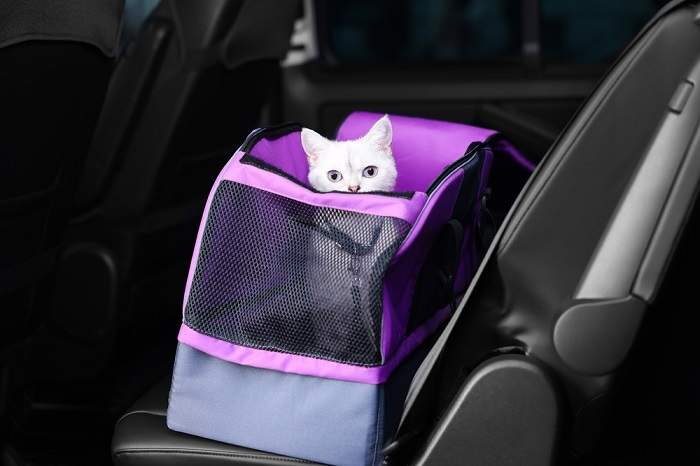
While traveling or going to the vet may seem trivial to us, to our cats, it can be stressful enough to justify the use of anxiety-reducing medication.
Trazodone is a sedative and anxiety-reducing medication that may be used in cats. It is especially useful for short-term relief of stress and anxiety related to travel or veterinary visits. It appears to be well-tolerated in general. However, it should be used carefully in cats on other medications, especially other anxiety-relief medications.
Drug Dosing Disclaimer: We are only able to provide doses for medications that are FDA approved for use in cats and only as the label guidelines dictate. For medications that are used off-label we can only provide guidelines and safety information for use. Safe and appropriate dosing for off-label medications can only be determined by a primary care veterinarian.
We encourage you to work with your veterinarian to determine if a particular medication is appropriate for your cat. Changing or adjusting a dose for your cat on your own without consulting with a veterinarian can carry risk. We do not encourage use of medications prescribed for human use in pets without first consulting with a primary care veterinarian.
